Research Results
![]() Field Projects: Fieldwork undertaken by University of Tsukuba researchers
Field Projects: Fieldwork undertaken by University of Tsukuba researchers
El-Rouj Basin Project (Syrian Arab Republic)
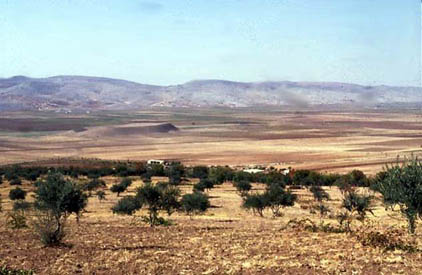 A University of Tsukuba archaeological team has been conducting fieldwork in the El-Rouj basin, north western Syria since the 1990s. Since 1997, Akira Tsuneki (Professor of Humanities and Social Sciences) has undertaken investigation of the site of Tell el-Kerkh. Occupation of the site from the Pre-Pottery Neolithic to the Pottery Neolithic (about 11,000 to 8,000 years ago) reflects the initial process of the change in early societies from village to city life. Hundreds of human bones ranging in body size were recovered from the village graveyard.
A University of Tsukuba archaeological team has been conducting fieldwork in the El-Rouj basin, north western Syria since the 1990s. Since 1997, Akira Tsuneki (Professor of Humanities and Social Sciences) has undertaken investigation of the site of Tell el-Kerkh. Occupation of the site from the Pre-Pottery Neolithic to the Pottery Neolithic (about 11,000 to 8,000 years ago) reflects the initial process of the change in early societies from village to city life. Hundreds of human bones ranging in body size were recovered from the village graveyard.
Further Information: http://www.sakura.cc.tsukuba.ac.jp/~elrouj/index.html
Salat Cami Yanı (Republic of Turkey)
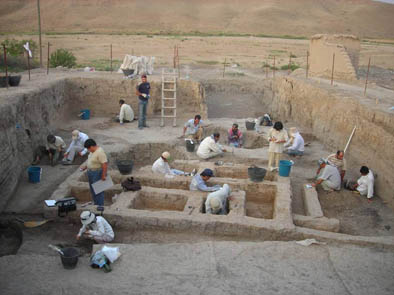
Salat Cami Yanı is a Pottery Neolithic site (about 9000 – 8000 years ago) located upstream in the Tigris basin of eastern Turkey. Yutaka Miyake (Associate Professor of Humanities and Social Sciences) at the University of Tsukuba has been head of the excavation team at the site from 2004 to 2010. Excavation has uncovered settlements inhabited for hundreds of years, including pise buildings, cooking facilities as well as infant burials located in the dwellings. The discovery of pottery at the site similar to the oldest pottery type in West Asia provides an important opportunity to extend research on the use of pottery in West Asia.
Further Information: http://www.histanth.tsukuba.ac.jp/~tap/scy/
Survey of cave sites in Arsenjan (Islamic Republic of Iran)
In November 2011, Professor Akira Tsuneki of the University of Tsukuba commenced a survey of Palaeolithic cave sites in Arsenjan, southern Iran. The aim of this fieldwork is to explore the routes taken by Homo sapiens moving out of Africa. Excavations at a site in Arsenjan have confirmed the presence of a Middle Palaeolithic layer containing artefacts underneath a Neolithic layer.
Research has just begun however it is hoped that this archaeological fieldwork will help clarify the process by which Homo sapiens moved out of Africa, passed through Iran and spread throughout the world.
![]() Rescue Projects for Archaeological Sites and Historical Resources
Rescue Projects for Archaeological Sites and Historical Resources
Tablet decryption at Tell Taban(Syrian Arab Republic)
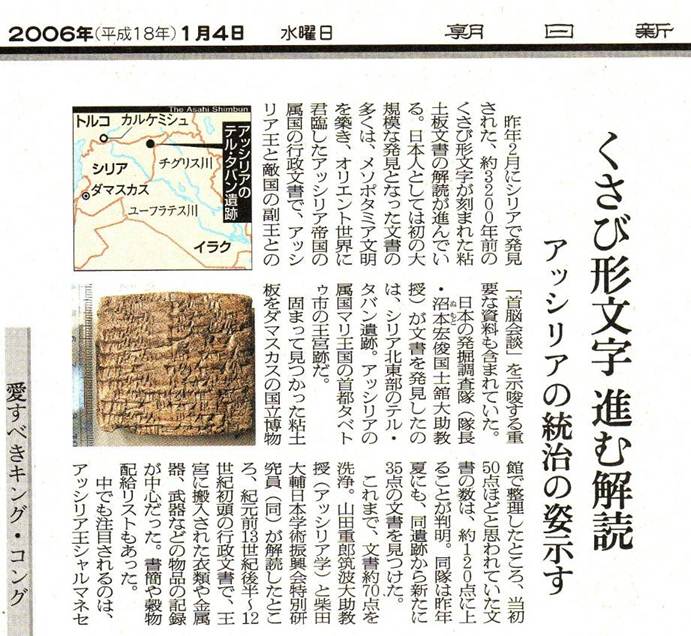
Assyriologists at the University of Tsukuba, Shigeo Yamada (Professor of Humanities and Social Sciences) and Daisuke Shibata (Assistant Professor) have been involved in the deciphering of cuneiform tablets from Tell Taban. The director of the project at Tell Taban is Hirotoshi Numoto (Professor of Kokushikan University) and excavations at Tell Taban (ancient name Tabetu) have unearthed hundreds of administrative documents, written in Akkadian, from the Old Babylonian and Middle Assyrian periods. The deciphering of these documents has revealed political, economic and social aspects of this society from varied perspectives. Decoding of the tablets is ongoing and the results are expected to extend understanding of this period of history.
Preservation and restoration of the Bamiyan ruins(Islamic Republic of Afghanistan)
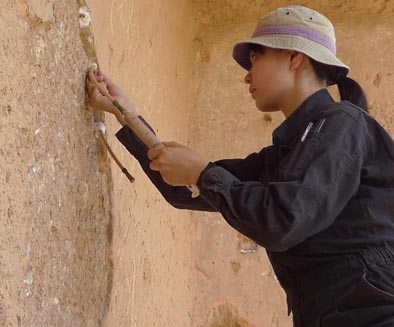
The Bamiyan ruins destroyed in the wake of civil unrest in Afghanistan in 2001 is registered as a site at risk by UNESCO. In order to preserve this world heritage site, site surveys and work sponsored by the Japan Trust Fund is being mainly undertaken by the National Research Institute for Cultural Properties, Tokyo. Yoko Taniguchi (Assistant Professor of Humanities and Social Sciences) is a member of the conservation team. Work being undertaken includes the conservation and restoration of the Buddhist murals. Data from chemical analysis of the pigments from the 7-10th century paintings indicates that these murals can be considered the world’s oldest oil paintings.
Tang-e Bolaghi (Islamic Republic of Iran)
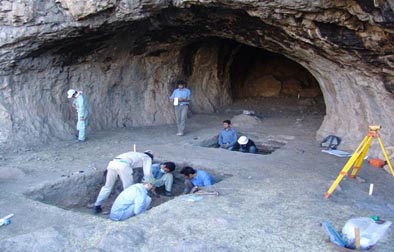
The construction of a river dam in the Fars region, Iran led to the commencement of the Sivand Dam rescue project in the Bolaghi valley in 2005. A joint team from University of Tsukuba (headed by Akira Tsuneki) and the Cultural Affairs Bureau of Iran’s Archaeological Heritage and Tourism Authority (ICAR) surveyed and excavated late Palaeolithic to early Neolithic sites in the Bolaghi valley with a view to clarifying transhumance and dispersal patterns for each period of occupation.
![]() Conferences organized by the Research Center for West Asian Civilization
Conferences organized by the Research Center for West Asian Civilization
The Third Sakura Meeting
The Research Center for West Asian Civilization hosted the Third Sakura Meeting on “Geography and Culture on the Habur and the Euphrates” on 9-10 October at the Tsukuba International Conference Center. This event was organized and chaired by Shigeo Yamada (Professor of Humanities and Social Sciences). The debate and discussion of cuneiform tablets from ancient West Asia included top class researchers from around the world including invitees from France and Japan.
International Symposium 2010
"The Pre-Pottery Neolithic in West Asia: Göbekli Tepe and its environs"
On December 16 2010, a international symposium sponsored by the Research Center for West Asia Civilization was held at the University of Tsukuba. Professor Klaus Schmidt from the German Archaeological Institute and leader of the excavation team at Göbekli Tepe was an invited speaker. The site of Göbekli Tepe, located in south eastern Turkey is known as a principle site for researchers engaged in the study of the Pre-Pottery Neolithic in West Asia. The symposium included presentations by researchers from the Research Center for West Asian Civilization as well as a presentation on the latest research and publications on work being undertaken at Göbekli Tepe, the world’s oldest ceremonial centre. On December 18 a public lecture was held in Tokyo in collaboration with the Ancient Orient Museum.
International Symposium 2011
"Burial Customs in Prehistoric West Asia"
xxxxxxxxxxxxxxxxxxxxxxxxxxxxxxxxx
Research Seminars
The regular seminar series of the Research Center for West Asian Civilizations commenced in November 2010 with subsequent seminars being held in January and February 2011. The presentations by two staff members of the center included information on current research and focused on a different theme: November, archaeology; January, geology and February, philology and conservation science.
![]() Education Program
Education Program
Lecture by Dr. Josef Kanjou
On November 8 2010 the Research Center for West Asian Civilization invited Dr. Joseph Kanjou from the Aleppo National Museum of the Syrian Arab Republic to give a presentation to students and graduate students at the University of Tsukuba as part of the center’s ongoing education program. The lecture focused on human remains and burials from Neolithic sites.
General Course: An Introduction to West Asian Civilization
In an effort to expand general knowledge a new course ‘Introduction to West Asian Civilization’ will be offered in the third trimester of 2011. This course contains lectures on diverse topics such as West Asian Civilisation history, archaeology, linguistics and environment. The weekly lesson plan is as follows:
Schedule 2011-2012 |
Lecture title |
Presenter |
|---|---|---|
| Week 1 5/12 | West Asian Civilization | Akira Tsuneki |
| Week 2 12/12 | The vegetation of West Asia | Toru Nakamura |
| Week 3 19/12 | The geology of West Asia | Kenichiro Hisada |
| Week 4 18/1 | West Asian prehistory | Yutaka Miyake |
| Week 5 23/1 | Towards urban civilization | Akira Tsuneki |
| Week 6 30/1 | Archaeology and contemporary society in West Asia | Osamu Maeda |
| Week 7 6/2 | Ancient West Asian language and characters | Jun Ikeda |
| Week 8 13/2 | The world of cuneiform documents | Daisuke Shibata |
| Week 9 20/2 | Looking at Palaeoenvironments using chemical analysis | Teruyuki Maruoka |
| Week 10 27/2 | West Asia and earthquakes | Yuji Yagi |
| Week 11 5/3 | End of term examination | Akira Tsuneki |